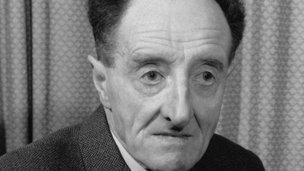Saunders Lewis milestone seminar at Swansea University
- Published

The seminar will discuss Saunders Lewis' work and the legacy left by his actions
A seminar in Swansea is to debate what legacy, if any, a politically-motivated arson attack in 1936 has left on Wales.
It marks the 75th anniversary of the sacking of the writer Saunders Lewis from the University of Wales in Swansea for his part in the attack.
He and two others set fire to a military installation at Penyberth on the Lleyn peninsula.
Organisers say the attack raises questions of ethics, justice, nation and territory.
Lewis was a playwright, poet and one of the co-founders of Plaid Cymru and a speech he made on the future of the language led to the setting up of Cymdeithas yr Iaith (Welsh language society).
Dr Daniel G Williams, from the Richard Burton Centre for the Study of Wales, which is organising the event, said the arson attack had been carried out against the background of the Ministry of Defence wanting to build a much-opposed facility.
"Saunders Lewis was a playwright and he was profoundly aware of the symbolic significance of 1936 being the 400th anniversary of the Act of Union (annexing Wales into England), and was in a sense looking for a cause," said Dr Williams.
During his court case in Caernarfon, Lewis said the "rights of a nation and its traditions were being ignored".
The three men had gone to the authorities to say they were responsible for the arson attack but a jury in Caernarfon failed to agree on a verdict, and another trial was held at the Old Bailey in London.
It was during this time that he was sacked from his job as lecturer at Swansea and there were protests across Wales.
The 'Penyberth Three' were then jailed for nine months at Wormwood Scrubs for the arson attack.
When the three men came back to Wales they were welcomed home by thousands, but it did not last, said Dr Williams.
"One of the debates will be 'what is the legacy - if at all - of Penyberth'.
"The Second World War broke out soon afterwards of course and it was perhaps forgotten or it's effects are still with us - that's a question for historians and cultural critics," he added.
The seminar will be held on Monday from 16:00 to 18:00 GMT in the Keir Hardie Building, Swansea University.
- Published15 January 2011
- Published9 February 2011